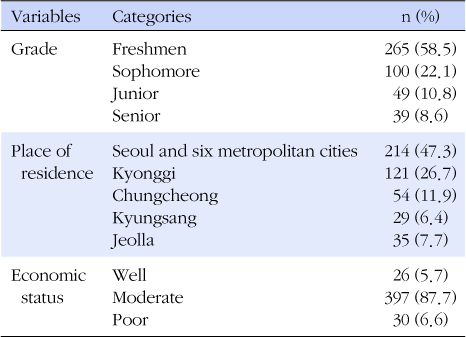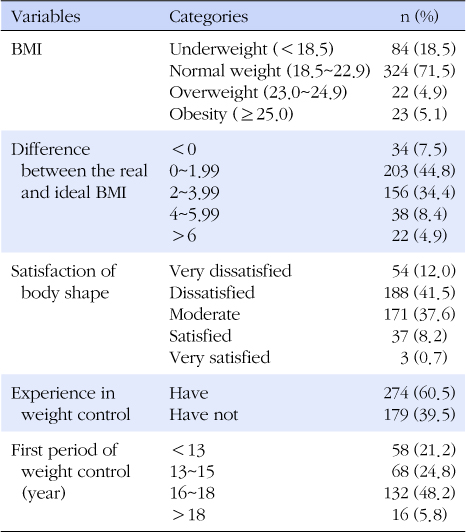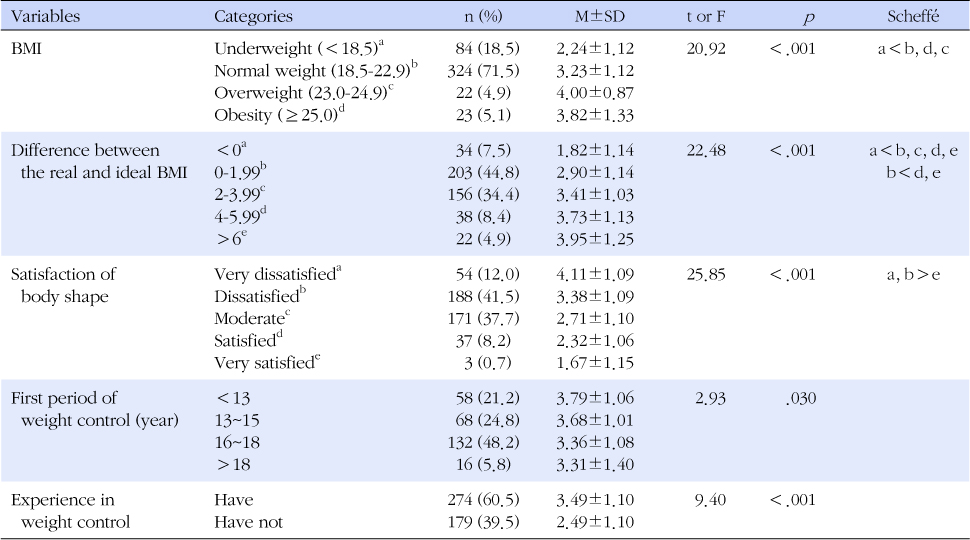Articles
- Page Path
- HOME > J Korean Acad Community Health Nurs > Volume 24(2); 2013 > Article
-
Original Article
- Factors affecting Weight-Control Behavior Intention in Female College Students: Based on the Theory of Planned Behavior
- Eun Ju Kim
-
Journal of Korean Academy of Community Health Nursing 2013;24(2):195-204.
DOI: https://doi.org/10.12799/jkachn.2013.24.2.195
Published online: June 30, 2013
Department of Nursing, Hanseo University, Seosan, Korea.
• Received: March 13, 2013 • Accepted: June 17, 2013
© 2013 Korean Academy of Community Health Nursing
- 675 Views
- 0 Download
- 6 Crossref
Abstract
-
Purpose
- This study was carried out to find factors affecting weight-control behavior intention in female college students based on the theory of planned behavior.
-
Methods
- The subjects were 453 female students from everywhere other than the Gangwon Province and Jeju Island. Data were collected by using a questionnaire.
-
Results
- The factors affecting weight-control behavior intention in female college students within 2 weeks were attitudes and subjective norms. These two factors accounted for 20.0% of weight-control behavior intention. Also, when body shape satisfaction and BMI were added to variables of the theory of planned behavior like attitudes, subjective norms, and perceived behavior control, these 5 factors accounted for a total of 34.1%.
-
Conclusion
- Due to their distorted perception in preferring skinny body shapes, female college students are likely to attempt at inappropriate weight control behavior. Through intervention with such factors as attitudes and body image satisfaction, which have been derived from the results of this study, healthy weight control behavior should be pursued in practice.
Figure 1Model of female college students' weight-control behavior intention based on theory of planned behavior.


- 1. Ajzen I, Fishbein M. Understanding attitudes and predicting social behavior 1980;Englewood Cliffs, NJ: Prentice-Hall.
- 2. Ajzen I. The theory of planned behavior. Organ Behav Hum Decis Process 1991;50(2):179–211.
- 3. Choi DJ. Study on factors related to self-weight control in high school students: Based on the health belief model and theory of planned behavior 2012;Seoul: Yonsei University; Unpublished master's thesis.
- 4. Glanz K, Lewis FM, Rimer BK. Glanz K, Lewis FM, Rimer BK. Theory, research, and practice in health education: Building bridges and forging. In: Health behavior and health education-Theory research and practice 1990;San Francisco: Jossey-Bass Publishers; 17–32.
- 5. Grunewald KK. Weight control in young college women: who are the dieters? J Am Diet Assoc 1985;85(11):1445–1450.
- 6. Han DY. Critical review of the social cognitive theories on health behavior. Korean J Health Psychol 1997;2(1):21–45.
- 7. Hwang EM. A Survey on body type perception, weight control, and eating habits according to BMI of college students 2010;Ulsan: Ulsan University; Unpublished master's thesis.
- 8. Jeun YS, Lee JR, Park CM. A Study on the development of weight controlling health behavioral model in women. J Korean Soc Health Educ Promot 2006;23(4):125–153.
- 9. Jeon YS. Influence of subjective perception of body image and weight management on obesity stress in college women 2006;Seoul: Sungshin Women's University; Unpublished mater's thesis.
- 10. Jung DJ. Influence of weight control behavior, body image, self-esteem, health promotion behavior and mental health promotion behavior in university female students by BMI. Exerc Sci 2006;15(4):365–376.
- 11. Jung YK. Predictive Factors of body weight control behavior of female college students 2003;Busan: Kosin University; Unpublished mater's thesis.
- 12. Kim EJ, Cha BK. Weight control behaviors in female college students. Korean J Women Health Nurs 2007;13(4):320–326.
- 13. Kim HK, Lee WY, Kim M. Factors influencing experiences and intention of weight control in elementary school children: Application of theory of planned behavior. J Phys Growth Motor Dev 2003;11(2):57–68.
- 14. Kim MS. Study on weight control attitude, obesity stress, depression and eating disorder of university students by actual overweight status and overestimated self body image 2010;Pocheon: Daejin University; Unpublished master's thesis.
- 15. Kim OS, Kim KH. Weight, self-esteem, and depression in high school and college females. J Korean Acad Adult Nurs 2000;12(3):396–406.
- 16. Lee JY, Park KS. Study on the theory of planned behavior applied to appearance management behavior: Focused on skin care, makeup, apparel, hair and weight management behaviors. Korean J Hum Ecol 2012;21(2):331–347.
- 17. Lee K, Kim E, Yom Y. Body esteem, body figure discrepancy and depression in women college students. J Korean Acad Fundam Nurs 2005;12(2):206–214.
- 18. Lee YJ. A study on the interest of the body weighting control, nutrition knowledge and dietary attitude of the middle school students 2000;Jeonju: Chonbuk National University; Unpublished master's thesis.
- 19. Park JA, Yoon JS. Dietary behaviors and status of nutrient intakes by the obesity levels of housewives inDaegu. Korean J Community Nutr 2005;10(5):623–632.
- 20. Ryu HK. A study of factors inducing weight control behavior in adolescent females 1998;Daegu: Keimyung University; Unpublished doctoral dissertation.
- 21. Shim SW, Lee JW, Sohn YK. An approach on drinking reduction campaign strategic establishment of Korean women's college students: An application of the theory of planned behavior. Korean J Advert Public Relat 2009;11(1):204–247.
- 22. Tucker LA, Tucker JM. Television viewing and obesity in 300 women: Evaluation of the pathways of energyintake and physical activity. Obesity (Silver Spring) 2011;19(10):1950–1956.
- 23. Um JW. Study on dietary habits and weight control of female college students by body image recognition 2008;Busan: Dong-A University; Unpublished master's thesis.
- 24. Yang HY. A study on the factors affecting weight control behavior of female college students 2012;Seoul: Ewha Womans University; Unpublished master's thesis.
Figure & Data
References
Citations
Citations to this article as recorded by 

- Understanding Body Image and Appearance Management Behaviors Among Adult Women in South Korea Within a Sociocultural Context: A Review
Kathy L. Lin, Vaishali V. Raval
International Perspectives in Psychology.2020; 9(2): 96. CrossRef - Self-Control, Depression and Eating Attitude according to Weight Control Behavior in College Women
Sunkyung Cha, Geunmyun Kim, Eunmi Lee
Stress.2019; 27(2): 152. CrossRef - The Relationships among Experiences of Traumatic Events, Post-traumatic Stress and the Needs for Health Promotion Programs of 119 Paramedics
Mi Suk Kang, Young Im Kim, Hyo Geun Geun
Journal of Korean Academy of Community Health Nursing.2017; 28(4): 524. CrossRef - Body Weight Control Behavior and Obesity Stress of College Women
Yang-Hee Kang, Kyung-Hee Kim
The Journal of the Korea Contents Association.2015; 15(2): 292. CrossRef - Associations between Weight Control Behavior and Health Behaviors in Korean Young Women: 2013 Community Health Survey
Jae-Hee Kim
Journal of the Korea Academia-Industrial cooperation Society.2015; 16(7): 4734. CrossRef - Predictive Factors on Blood donation Intention and Behavior in College Students: Base on the Theory of Planned Behavior
Yu-Jeong Kim, In-Hee Choi
Journal of the Korea Academia-Industrial cooperation Society.2014; 15(6): 3789. CrossRef

 KACHN
KACHN





 PubReader
PubReader Cite
Cite


